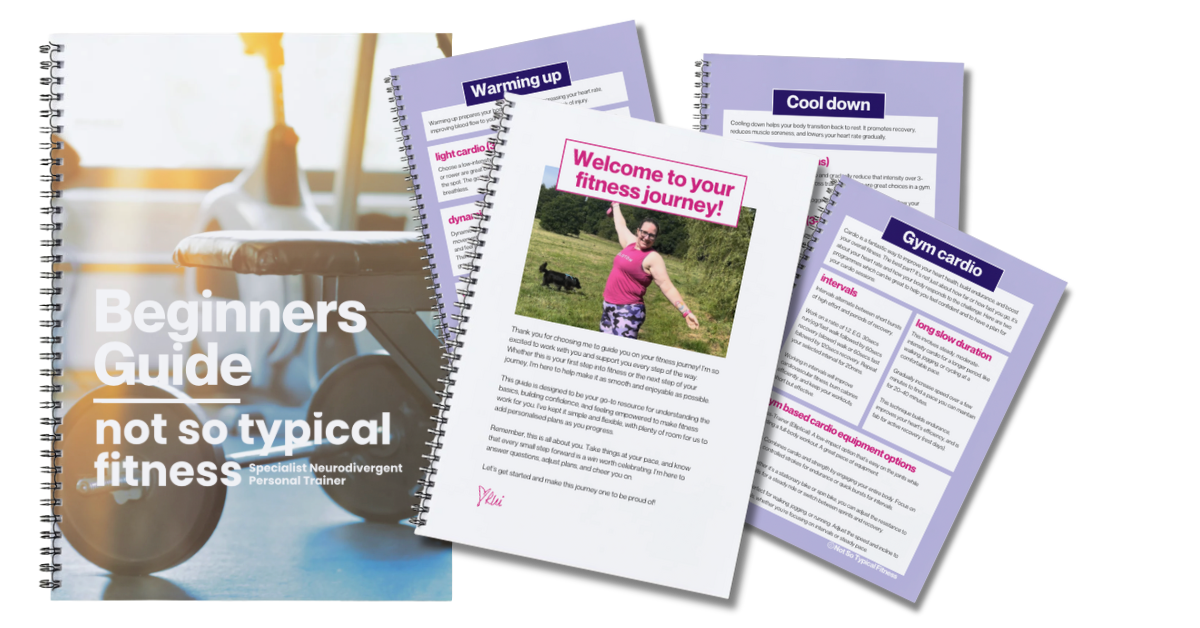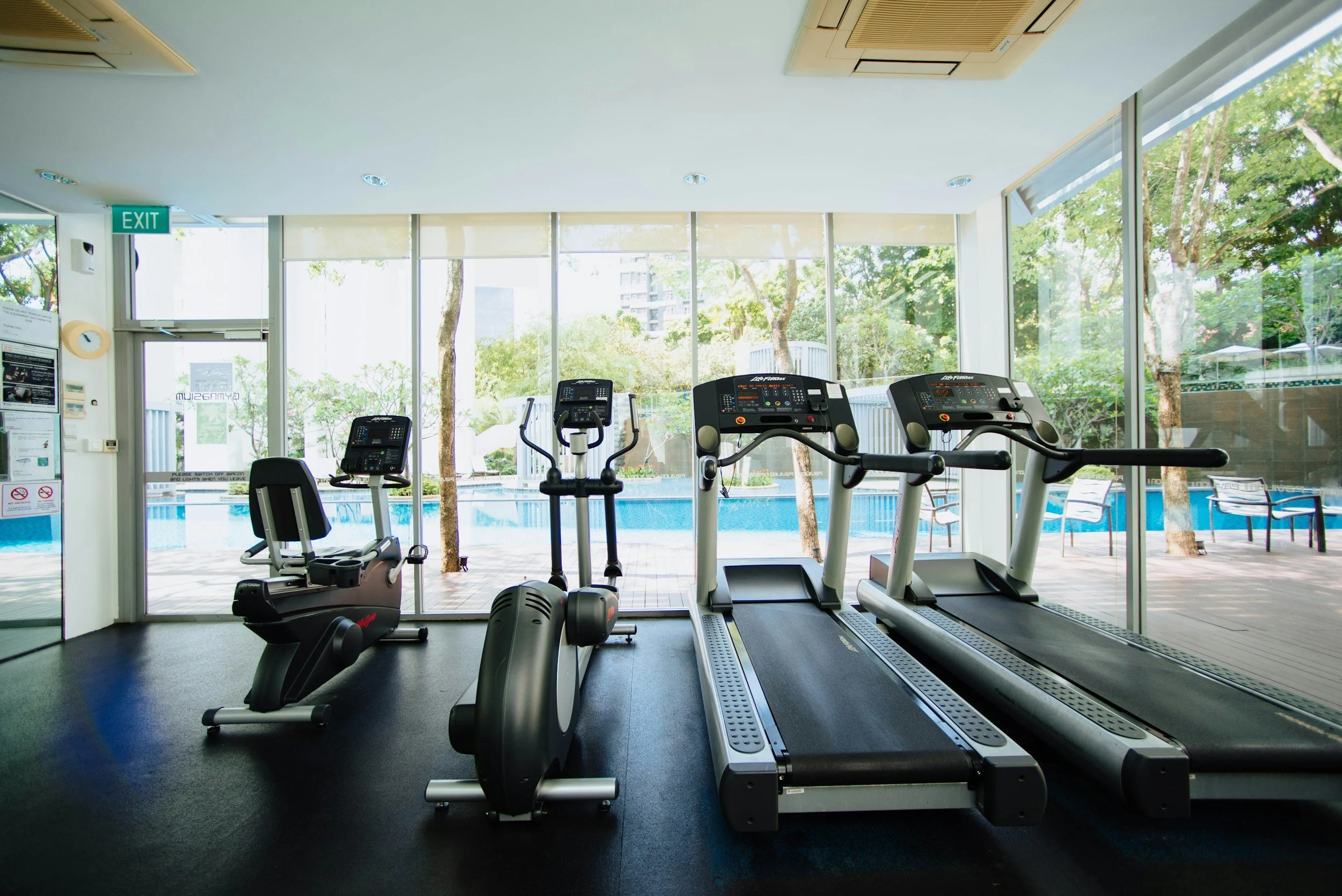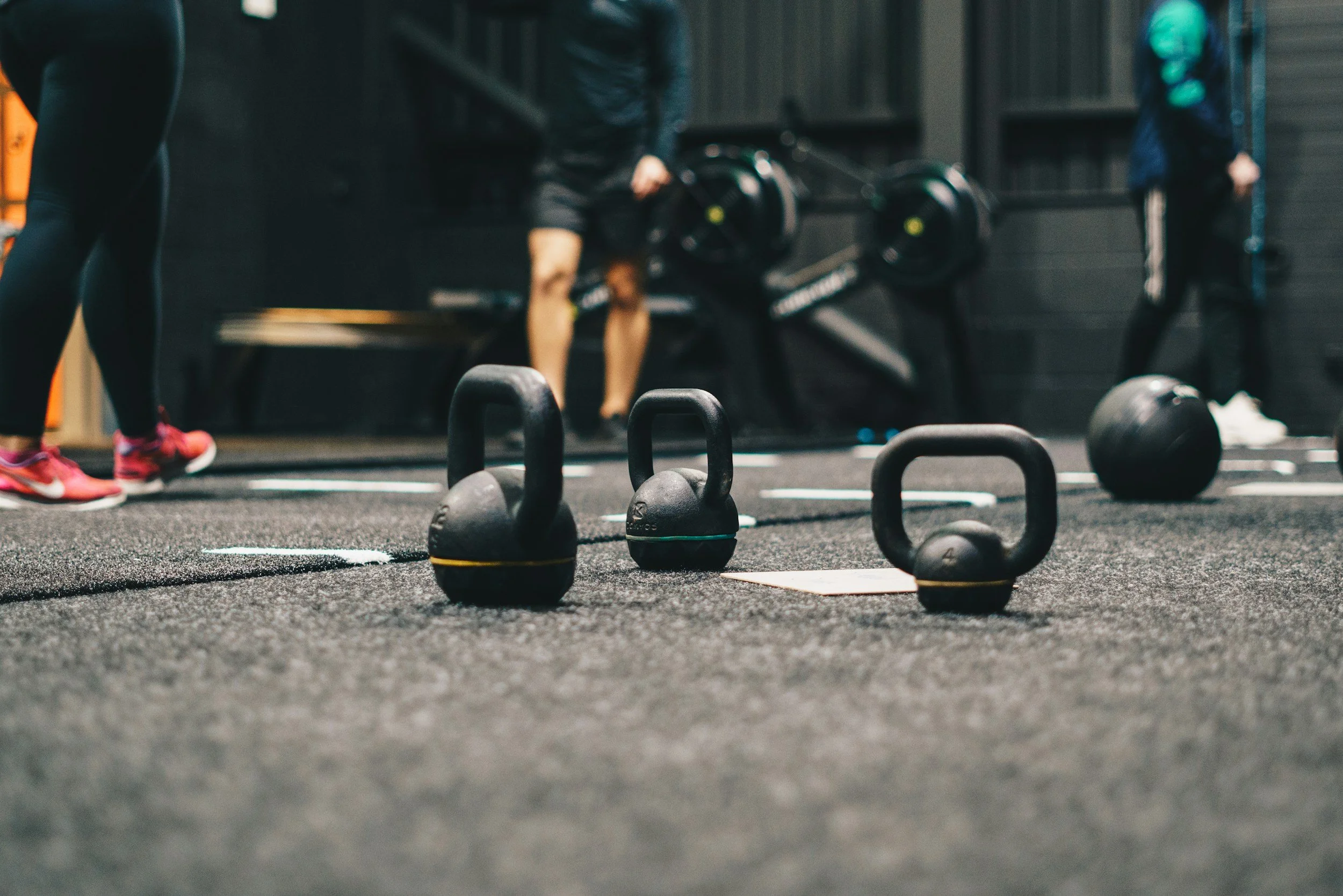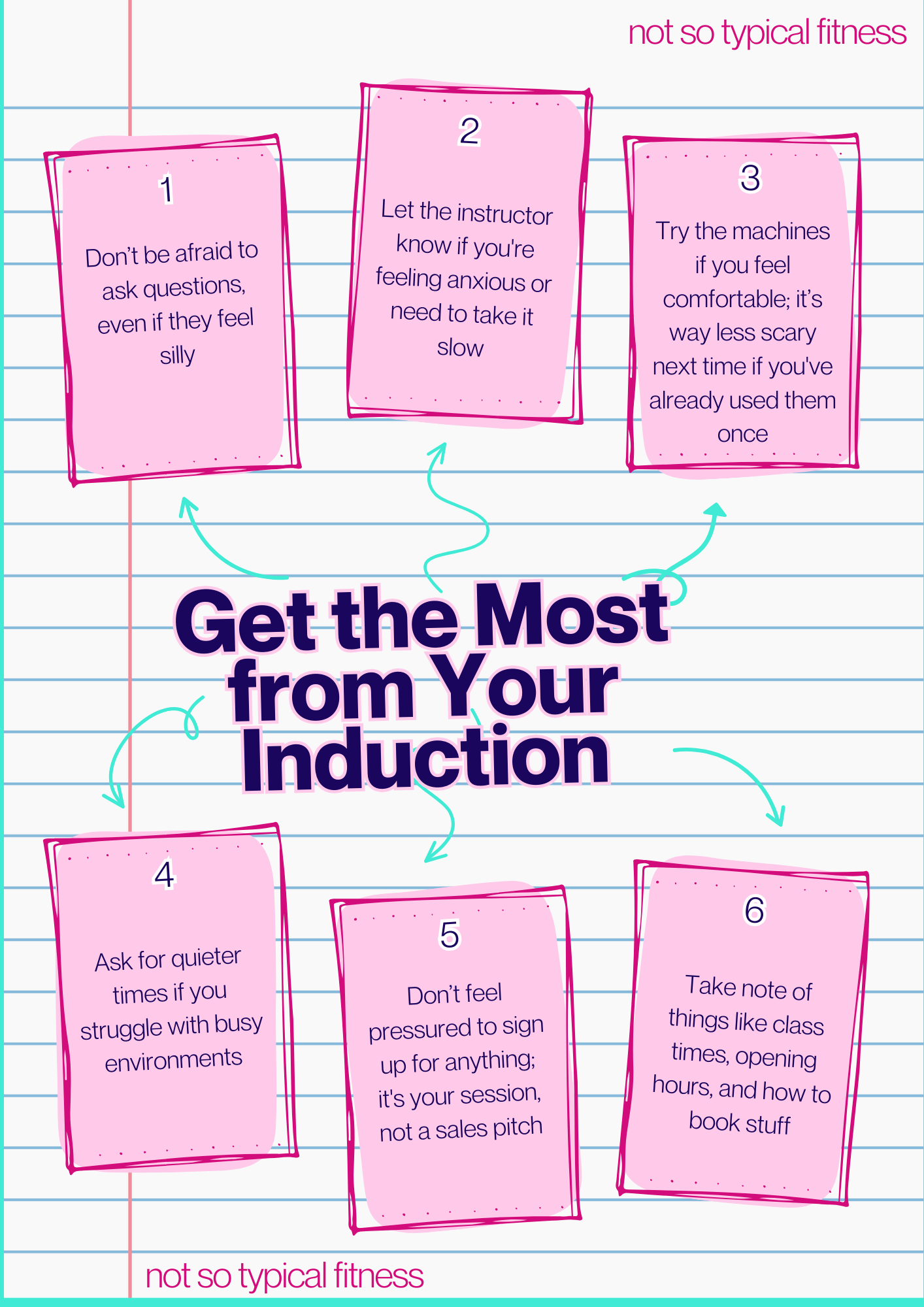What Happens at a Gym Induction? (Complete Guide 2026)
Wondering what actually happens at a gym induction? Or whether you even need one? You're not alone.
This complete guide covers:
What happens step-by-step during a gym induction
Whether gym inductions are required (and what happens if you skip it)
How long they take and what you'll be asked to do
Whether you get tested or measured (and if you can say no)
What to wear and bring
Tips for feeling confident if you're nervous
New to gyms entirely?
This guide pairs perfectly with our Gym Basics for Beginners, which explains reps, sets, and equipment in simple terms.
Feeling nervous about your first gym visit?
Download my free Gym Anxiety Toolkit for practical strategies to manage overwhelm and sensory challenges before you even walk through the door.
Ready to finally stick with the gym, without the chaos, crowds, or confusion?
Join hundreds of anxious people using the Sensory-Safe Strength System to build strength and confidence in just 8 weeks. Only £27.
Quick Answers to Top Questions
Not sure if you need a gym induction or what's involved? Here are the essentials:
Is a gym induction required?
Most gyms in the UK require inductions for insurance/safety reasons. Some chain gyms (like PureGym) don't require them but offer optional tours. Without an induction, many gyms won't let you use free weights or certain equipment.
What actually happens during a gym induction?
You'll get a facility tour, equipment demonstrations, safety briefing, and health questionnaire (PAR-Q). Optional fitness testing may be offered but you can always decline.
How long does a gym induction take?
Chain gyms: 30-45 minutes
Independent gyms: 60+ minutes
Bring questions; longer is better than feeling confused later.
Will I be tested or measured?
Only if you want to be. Fitness assessments (body composition, strength tests) are optional. You can decline and focus on learning equipment instead.
What should I wear?
Comfortable workout clothes, supportive trainers, and bring a water bottle. You won't do a full workout, but you might try equipment.
Want the full details? Keep reading for the complete step-by-step guide below.
Table of Contents
Safety & Health
Facilities & Equipment
Costs & Types
Tips for Success
FAQs & Next Steps
What Is a Gym Induction?
A gym induction is a guided session designed to introduce you to the facilities, equipment, and safety rules. It helps you feel comfortable, confident, and ready to start working out safely.
Gyms run inductions for insurance and safety purposes, but they’re really there to set you up for success.
Step-by-Step: What Happens at a Gym Induction
The typical gym induction process includes:
Warm welcome and introductions with your assigned trainer
Facility tour covering all areas and amenities
Hands-on equipment demonstrations and safety training
Goal-setting discussion tailored to your fitness aspirations
Practical information about classes, apps, and member services
Optional fitness assessments (completely your choice)
How Long Does a Gym Induction Last?
Most gym inductions last between 30-60 minutes, but the duration depends on several factors:
Chain gym inductions typically take:
30-45 minutes for basic coverage
Focus on essential safety and equipment overview
Streamlined process across all locations
Independent gym inductions often last:
60+ minutes for comprehensive coverage
More personalised attention and detailed instruction
Flexible timing based on your experience level
Factors affecting induction length:
Your fitness experience level
Number of questions you ask
Whether you choose optional fitness assessments
Gym size and equipment variety
Time spent on goal-setting discussions
Not So Typical Fitness Top Tip: Book your induction when you have plenty of time - rushing through it defeats the purpose of building confidence. Many people find it helpful to visit during quieter gym times for their induction when possible. Less crowded = less overwhelming.
Gym Health and Safety
You’ll usually be informed about essential safety information, such as:
Fire exits and emergency procedures
First aid station locations and emergency contact protocols
Basic safety protocols for equipment use
Equipment usage guidelines and weight limits
Gym etiquette rules to keep everyone safe
What to do if equipment malfunctions
Simple Health Questionnaire (PAR-Q)
You’ll usually complete a short health questionnaire before starting (often called a PAR-Q). This helps staff tailor advice and keep you safe.
Your health questionnaire typically includes:
Current medications or medical conditions
Previous injuries or physical limitations
Exercise experience level
Any anxiety or concerns about gym use
Emergency contact information
Why this matters for first-time gym users:
Ensures staff can provide appropriate exercise modifications
Helps trainers spot potential safety issues
Creates a baseline for tracking your fitness progress
Required by gym insurance for your protection
Don't worry if you have health concerns - gyms are experienced in accommodating all fitness levels and medical conditions. Being honest about limitations helps them keep you safer, not exclude you.
Note for neurodivergent gym-goers: If you're autistic, ADHD, or have sensory sensitivities, it's worth mentioning this during your health questionnaire. A good gym will work with you to create a more comfortable experience. Read our Ultimate Guide to Neurodivergent Fitness to understand how your brain processes fitness environments differently.
What Facilities to Expect (Gym Tour)
A qualified team member or fitness instructor will give you a complete walkthrough of your new gym, making sure you know where everything is located. This isn't a test - they want you to feel completely at home before your first solo workout.
Essential exercise areas (don't worry if you don't know what these are - you're not expected to know everything):
Cardio zone - treadmills, bikes, ellipticals and rowing machines
Weights area - free weights, dumbbells, barbells and resistance machines
Functional training space - for bodyweight exercises, stretching, TRX and dynamic movements
Stretching and cool-down zones - mats, foam rollers and recovery equipment
Amenities and facilities you'll discover:
Changing rooms and lockers - including day-use and rental options
Showers and toilets - plus any towel services available
Group exercise studios - with class schedules and booking information
Reception and member services - where to get help and ask questions
Additional amenities - saunas, pools, juice bars, or specialised training areas
What your tour guide will explain:
Peak hours vs. quieter times for each area
Any booking requirements for studios or specialised equipment
Location of water fountains and emergency equipment
Wi-Fi access and phone charging stations
Where to find staff if you need assistance
Not So Typical Fitness Top Tip: Take mental notes or ask if you can snap a quick photo of the layout - it'll help you navigate confidently on your next visit!
Feeling overwhelmed by all the areas and equipment? That's completely normal. Our Gym Basics Guide breaks down what all the equipment does in plain language, so you can walk in feeling more prepared.
Gym Equipment Demo for Beginners
During your induction, staff will show you how to safely use key equipment:
Cardio machines – how to adjust settings, start/stop safely
Strength machines – how to set seat height, change weights
Free weights – basic lifting technique and spotting
Safety features – emergency stop buttons, staff support points
You'll get hands-on instruction on how to use some basic equipment safely, typically including:
Cardio equipment basics:
How to start/stop treadmills safely
Adjusting resistance on bikes and ellipticals
Emergency stop buttons and safety features
Proper form and posture tips
Strength equipment fundamentals:
How to adjust machines to fit your height
Basic operation of weight machines
Safety protocols for free weights
Proper lifting techniques
Understanding Gym Etiquette
Your induction will cover basic safety, but there are also unwritten social rules that can cause anxiety if you don't know them:
Common gym etiquette basics:
Re-racking weights after use
Wiping down equipment with provided spray
Not monopolising equipment during busy times
Asking "Can I work in?" if someone's using equipment you need
Staying aware of your surroundings
Don't worry - these aren't tested! But knowing them ahead of time can reduce social anxiety significantly.
Read our complete guide: Gym Rules: Re-Rack Your Weights to understand all the unwritten rules before your first visit.
Worried about making mistakes? Gymtimidation is real, but there are practical ways to overcome it.
Optional Fitness Assessments (Explained)
Some gyms offer optional assessments to measure your starting point:
Flexibility and mobility checks
Cardio capacity tests
Body composition analysis
Strength or grip tests
Blood pressure and heart rate
These are always optional. You can say no and focus on learning equipment first. A good gym will never pressure you into assessments. If staff seem pushy about testing, that's a red flag about their approach to member care.
Alternative approach: Some people find it helpful to take before photos on their own terms to track progress without the pressure of gym staff assessments.
Setting Fitness Goals During Your Induction
Many gyms include a short chat about your goals. This can be as formal or informal as you like.
You might discuss:
Weight loss or body composition goals
Building strength and muscle
Improving cardio health
General wellbeing or confidence
Not sure about your goals? That’s fine. You can always start with the basics and decide later. If you need help with goal-setting, our guide on setting realistic fitness goals can help you clarify what you actually want (beyond what the fitness industry says you should want).
If you're neurodivergent: Traditional goal-setting advice often doesn't work for ADHD or autistic brains. Read about creating routines that actually work for you.
Membership Info and How to Get the Most Value
Staff will also explain:
How to book classes and facilities
Which classes are beginner-friendly
How the gym app works
Membership perks (guest passes, discounts, etc.)
Personal training or nutrition add-ons
Not So Typical Fitness Top Tip: don’t feel pressured to buy anything extra; inductions are about safety and support, not sales.
What to Wear for Your Gym Induction
Wear clothes that make you feel comfortable and confident.
Tops: breathable t-shirt or tank; sports bra for support
Bottoms: leggings, shorts, or joggers; avoid overly baggy clothing
Shoes: clean trainers with grip and support (no sandals or fashion shoes)
Accessories: water bottle, small towel, padlock for lockers, hair tie
Leave jewellery, perfumes, and bulky bags at home.
Sensory considerations: If you're sensitive to textures, avoid tags and seams that might irritate you. Our gym clothing guide covers sensory-friendly fabric options and what to avoid when you sweat.
Who Needs a Gym Induction (and Why)
Inductions aren’t just for beginners; they benefit everyone:
First-time gym users
Returning after a long break
Switching to a new gym with different equipment
Anyone with medical conditions
People who feel anxious in new environments
Neurodivergent gym members who want to reduce overwhelm
Even experienced lifters should get familiar with each gym’s rules and layout.
For neurodivergent people specifically: Inductions are especially valuable if you're autistic or ADHD because they:
Reduce uncertainty and anxiety
Provide explicit instruction vs. expecting you to "figure it out"
Let you ask questions in a structured environment
Create familiarity before your first solo visit
Learn more: Why My Neurodivergence Shapes My Approach to Fitness
Gym Induction Costs: Free or Paid?
Most gyms include basic inductions for free in your membership. This should cover:
Safety briefing
Facility tour
Equipment demo
App setup
Extras that may cost more:
Personal training sessions
In-depth body composition tests
Custom workout plans
If a gym is charging extra for mandatory safety inductions, that is probably a red flag and something not to be ignored.
Chain vs Independent Gym Inductions
Chain gyms (JD, PureGym, The Gym Group, Anytime Fitness):
Consistent and efficient
30–45 minutes
Focus on safety and essentials
Tech-driven apps and resources
Can feel less personal
Independent gyms:
Longer, 60+ minutes
Highly personalised
Flexible pacing and focus
Strong community feel
Varies in quality by gym
Choose based on whether you prefer efficiency and structure or personal attention and flexibility.
Watch this episode of the not so typical fitness podcast to find out more about what to expect at a gym induction:
What to Expect at Specific UK Gym Chains
Different gym chains handle inductions differently. Here's what to expect:
PureGym
Induction: Optional (not required)
Duration: 20-30 minutes if you book one
What's covered: Basic equipment tour, app setup
Best for: Confident beginners who don't need hand-holding
Learn more: When Is PureGym Quietest guide
JD Gyms
Induction: Recommended but not always enforced
Duration: 30-45 minutes
What's covered: Full facility tour, equipment demos, class bookings
Best for: First-time gym users who want structured guidance
Learn more: JD Gyms Wolverhampton guide
The Gym Group
Induction: Required for access to certain equipment
Duration: 30-40 minutes
What's covered: Safety briefing, facility tour, equipment basics
Best for: Budget-conscious beginners who want safety coverage
Anytime Fitness
Induction: Included with membership
Duration: 45-60 minutes
What's covered: Personalised tour, goal discussion, equipment training
Best for: People who want more personalised attention
David Lloyd
Induction: Comprehensive and required
Duration: 60+ minutes
What's covered: Full facility tour including pool/spa, class intro, detailed equipment training
Best for: Premium experience seekers who want thorough coverage
Tip: Know how to set your locker padlock first → read our David Lloyd padlock guide
After Your Induction: How Many Times Should You Go?
You've completed your induction - now what? How often should you actually visit the gym?
For beginners, we recommend:
Start with 2-3 sessions per week
Focus on building the habit, not intensity
Allow rest days between sessions
Gradually increase as you build confidence
Read our complete guide: How Many Gym Sessions Should Beginners Do?
Struggling with consistency? This isn't about willpower - it's about systems. Learn how to stay motivated without motivation.
Tips to Make the Most of Your Gym Induction
Before You Go:
Confirm induction time and location
Pack appropriate workout clothes and shoes
Bring water bottle and towel
Prepare list of questions
Arrive with realistic expectations
If asking questions makes you anxious, you might be experiencing Rejection Sensitive Dysphoria. Your brain might be telling you that questions reveal incompetence, that the staff member will judge you, or that you should already know this. Here's the truth: gym staff expect questions. That's why inductions exist.
During Your Induction:
What are the busiest/quietest times?
How do I book classes or facilities?
Where can I get help if I'm unsure about equipment?
What's the wifi password?
Are there any beginner programs or classes?
After Your Induction:
Plan your first independent visit
Download and set up the gym app (if applicable)
Book a beginner class (if interested)
Schedule follow-up support if needed
Next Steps: Feel Confident at Your First Gym Induction
A good gym induction sets the foundation for a positive, safe fitness journey. Whether it's your first time entering a gym or you're starting fresh at a new facility, remember that everyone there wants you to succeed.
Your next steps:
Call your gym to schedule your induction if you haven't already
Prepare your questions and pack appropriate clothing
Approach with curiosity rather than anxiety - this is your first step toward better health
Ready to Take the Next Step?
You know what happens at a gym induction - but what if you want extra support to feel truly confident?
Option 1: Learn More First (Free Resources)
Comprehensive Guides:
The Complete Guide to Overcoming Gym Anxiety & Intimidation - 7 proven strategies and word-for-word scripts
Ultimate Guide to Neurodivergent Fitness - How to adapt fitness to your brain
Gym Basics for Beginners - Understand equipment and terminology
Specific Concerns:
Finding Quiet Gym Times - Reduce sensory overwhelm
Gymtimidation is Real - You're not alone in feeling intimidated
What to Expect in Your First PT Session - If you're considering a trainer
Option 2: Get a Structured System (£27)
The Sensory-Safe Strength System - Know exactly what to do after your induction with 8 weeks of zero-decision workouts.
Perfect if you:
Want clear instructions without figuring it out yourself
Need sensory accommodations built into the plan
Struggle with executive dysfunction or decision fatigue
Want to feel confident and in control
Just £27 (normally £127)
Get the Sensory-Safe Strength System →
Option 3: Gentle Guided Start (£349)
Gym Confidence Starter Package - Three supportive 1:1 sessions designed specifically for anxious beginners.
Includes:
Personalised gym orientation beyond standard induction
Three 1:1 online sessions (up to 50 minutes each)
Complete toolkit of resources
Four weeks of accountability support
Perfect if you:
Feel too anxious to go alone after your induction
Want someone to walk you through everything step-by-step
Need ongoing support beyond a single session
Prefer human guidance to self-paced programs
Learn About the Gym Confidence Starter Package →
Option 4: Ongoing Personal Support
Neurodivergent-Friendly Personal Training - Work with me 1:1 at JD Gyms Wolverhampton or Codsall Leisure Centre.
Perfect if you:
Live in the Wolverhampton area
Want face-to-face support
Need adaptations for sensory sensitivities
Prefer ongoing coaching vs. short-term support
Available:
In-person sessions at JD Gyms or Codsall Leisure Centre
Home-based training if gym environments feel too overwhelming
Online coaching with flexible scheduling
Book a Free Discovery Call → to discuss which option feels right for you.
Option 5: Free Community Support
Not ready to invest yet? Join the free Neurodivergent Fitness Community for peer support, shared strategies, and encouragement from others who understand your challenges.
You'll find:
People who've been through gym inductions and survived
Tips for managing anxiety and overwhelm
Support for neurodivergent-specific challenges
Accountability without pressure
Frequently Asked Questions About Gym Inductions
Q: Do I need to book a gym induction in advance?
A: Yes, most gyms require advance booking for inductions. Call or book online when you sign up for membership. Popular times (evenings and weekends) book up quickly, so schedule as soon as possible. Some chain gyms do not require an induction.
Q: What happens if I don't do a gym induction?
A: Many gyms won't allow you to use certain equipment (especially free weights) without completing an induction. Some may restrict your access entirely until you've had the safety briefing.
Q: Can I use the gym before my induction?
A: This varies by gym. Some allow limited access to basic cardio equipment, while others require the induction before any gym use. Check your specific gym's policy when joining.
Q: Is a gym induction the same as personal training?
A: No - a gym induction is a basic safety and facility tour, while personal training is ongoing, personalised fitness coaching. Many gyms offer discounted personal training sessions after your induction.
Q: How long does a gym induction typically take?
A: Most inductions last 30-60 minutes, depending on the gym type and your questions. Chain gyms tend to be shorter (30-45 minutes), while independent gyms often provide longer, more detailed sessions.
Q: Do I have to participate in fitness assessments during my induction?
A: No, fitness assessments and measurements are typically optional. You can decline any testing that makes you uncomfortable - focus on learning about the facilities and equipment instead.
Q: Can I bring a friend to my gym induction?
A: Many gyms allow this, especially if it helps with anxiety. Check with your gym when booking - some may require your guest to sign a waiver or pay a day pass fee.
Q: What if I'm too nervous to try the equipment during my induction?
A: That's completely normal! Let your instructor know you'd prefer to just observe this time. You can always ask for equipment demonstrations during quieter hours later.
Q: Will I be pressured to buy personal training or additional services?
A: Some gyms, particularly chains, may present additional services during inductions. Remember, you're under no obligation to purchase anything on the spot - take time to consider any offers.
Q: What happens if I miss my scheduled induction?
A: Most gyms will reschedule your induction without penalty. Some may require you to complete one before using certain equipment, so contact them as soon as possible to arrange a new time.
Q: What if I'm autistic or ADHD - should I tell the gym staff?
A: This is completely up to you, but mentioning sensory sensitivities or need for clear instructions can help staff accommodate you better. A good gym will work with you, not dismiss your needs. Read: Being a Neurodivergent Personal Trainer to understand what good accommodation looks like.
Q: Can I do another induction if I didn't understand everything?
A: Absolutely! Most gyms are happy to schedule follow-up sessions. You can also book time with a personal trainer for additional guidance. If your gym isn't accommodating, that might be a sign it's not the right fit.
Q: What if the standard induction wasn't enough for me?
A: Standard inductions cover safety basics but might not address anxiety, sensory concerns, or neurodivergent needs. This is exactly why I created the Gym Confidence Starter Package - to bridge the gap between standard inductions and actually feeling confident.
Q: What questions should I ask during my gym induction?
A: Essential questions to ask:
What are the quietest times to visit?
How do I book classes or facilities?
Where can I get help if I'm unsure about equipment?
Are there beginner-friendly classes?
What's the wifi password?
What happens if equipment breaks while I'm using it?
Don't worry about sounding "stupid"; gym staff expect questions. That's why inductions exist.
Q: Can I skip my gym induction if I've worked out before?
A: Even if you're experienced, each gym has different equipment, layouts, and rules. A quick induction ensures you know where things are and how to access all facilities. Many experienced lifters find value in learning gym-specific procedures.
Q: What if I'm too anxious to do a gym induction?
A: Completely normal. Options:
Book during quieter times (weekday mornings)
Ask if you can bring a friend for support
Request a female trainer if that helps
Mention your anxiety; good gyms will accommodate
Consider the Gym Confidence Starter Package for extra support beyond standard inductions
What Clients Say
"Rhiannon's approach made my first gym experience so much less scary. I actually enjoyed my induction!"
"The personalised attention helped me understand exactly what I needed to feel confident."
This guide was last updated in January 2026 to reflect current gym practices and inclusive fitness approaches. For location-specific guidance, visit me at JD Gyms Wolverhampton.
















